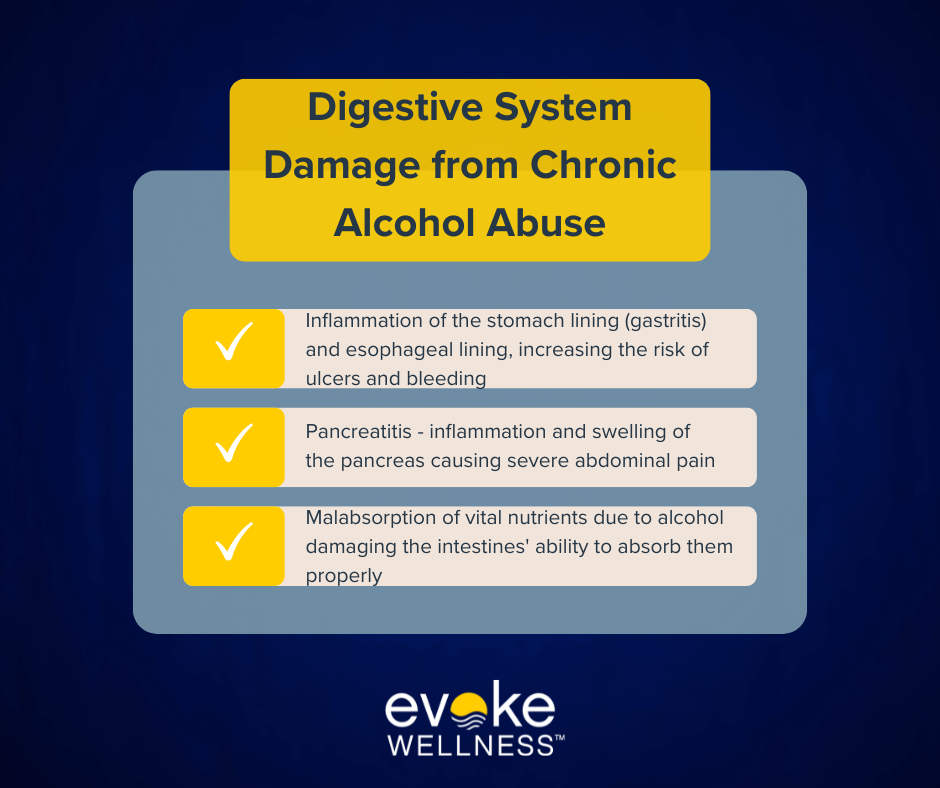You may think an occasional drink is harmless, but prolonged alcohol abuse can wreak havoc on your body and mind. Recent studies show that over 14 million U.S. adults struggle with alcohol use disorder, with devastating consequences. From liver damage to cognitive decline, the effects of chronic drinking are far-reaching and often irreversible. At Evoke Wellness at Waltham, we understand the complexities of alcohol addiction and offer comprehensive treatment programs to help you reclaim your health and sobriety. Whether you need intensive outpatient care, day treatment, or a veterans program, our expert team provides personalized support on your journey to recovery.
Together, let’s embrace the journey to recovery and the promise of a new beginning. Call us at (833) 287-7223 today or reach out online.
What are the Long Term Side Effects of Alcoholism?
Liver Damage
Chronic alcohol abuse can lead to severe and potentially life-threatening liver damage. The liver metabolizes alcohol, and excessive drinking overwhelms its ability to process it efficiently. This can cause fatty liver disease, inflammation, and scarring (cirrhosis) over time. Symptoms may include abdominal pain, nausea, and jaundice.
Cardiovascular Problems
Long-term heavy drinking can negatively impact the cardiovascular system. It increases the risk of high blood pressure, heart disease, heart attack, and stroke. Alcohol abuse also contributes to weight gain, arrhythmias, cardiomyopathy (weakened heart muscle), and a higher risk of heart failure.
Neurological Impairment
Alcohol is a neurotoxin that can damage brain structure and function with prolonged abuse. This can lead to cognitive deficits, memory loss, impaired motor skills, and difficulty with emotional regulation. In severe cases, it may cause Wernicke-Korsakoff syndrome, a brain disorder characterized by mental confusion, paralysis of eye movements, and persistent learning and memory problems.
Increased Cancer Risk
According to the National Cancer Institute, alcohol consumption is a leading modifiable risk factor for several types of cancer, including mouth, throat, voice box, esophagus, liver, colon and rectum, and breast cancer in women. The more alcohol consumed over time, the higher the cancer risk.
Seeking professional help from reputable alcohol addiction treatment programs like night treatments, veterans programs, or sober living facilities can aid in overcoming alcoholism and minimizing long-term health consequences. Early intervention is crucial for the best possible outcomes.
Liver Damage: A Common Effect of Long Term Alcohol Abuse
A Deadly Progression
Excessive alcohol consumption over an extended period can wreak havoc on your liver’s health. As you continue drinking heavily, your liver becomes increasingly inflamed, leading to a buildup of scar tissue that impairs its function. This can set off a dangerous chain reaction, progressing from alcoholic fatty liver to alcoholic hepatitis, and eventually to cirrhosis – the severe scarring and hardening of the liver.
Warning Signs to Heed
Pay close attention to warning signs like fatigue, loss of appetite, abdominal pain, and jaundice (yellowing of the skin and eyes). These could indicate advanced liver damage caused by your alcohol abuse. Ignoring these red flags and continuing to drink heavily can lead to life-threatening complications such as liver failure, internal bleeding, and an increased risk of liver cancer.
Seeking Professional Help
If you’re struggling with alcohol addiction, it’s crucial to seek professional treatment before the damage becomes irreversible. An effective alcohol addiction treatment program combines medication, counseling, and support groups to address the root causes and develop healthy coping mechanisms. This holistic approach can help you achieve long-term sobriety and potentially reverse or mitigate further liver damage.
Heart Disease and Other Cardiovascular Effects
Increased Risk Factors
Long-term alcohol abuse takes a significant toll on your cardiovascular system. Excessive drinking leads to high blood pressure, arrhythmias (irregular heartbeats), stroke, and cardiomyopathy (weakened heart muscle). According to research from the National Institute on Alcohol Abuse and Alcoholism, heavy drinking can raise your risk of heart disease and is associated with a higher incidence of heart attacks.
Compounding Health Issues
The cardiovascular dangers are compounded when alcohol use disorder co-occurs with other conditions like obesity, diabetes, or tobacco use. As noted by the American Heart Association, secondhand smoke exposure alone increases the risk of heart disease by about 25-30%.
Path to Recovery
Seeking comprehensive addiction treatment is crucial to mitigate these risks. Evidence-based programs like cognitive behavioral therapy, dialectical behavior therapy, and holistic mind-body approaches can facilitate lasting recovery. Medication-assisted treatment can manage withdrawal symptoms, allowing you to focus on the psychological aspects of overcoming alcohol dependence.
Brain and Nervous System Damage from Long Term Alcohol Use
Long-Term Neurological Effects
Chronic alcohol abuse can inflict severe and often irreversible damage on the brain and nervous system. Heavy, long-term drinking may increase the risk of developing Wernicke-Korsakoff syndrome, an incurable brain disorder characterized by profound memory loss, confusion, and impaired cognitive abilities. Alcoholism can also lead to a thiamine deficiency, potentially resulting in irreversible dementia.
Mental Health Impacts
In addition to neurological complications, alcoholism frequently co-occurs with psychiatric disorders, such as major depression, bipolar disorder, and anxiety. Excessive drinking often exacerbates symptoms of these conditions by disrupting the brain’s delicate chemical balance. Left unchecked, this vicious cycle of alcohol abuse and mental illness can precipitate psychosis, suicidal ideation, and the erosion of personal relationships.
Alcohol and Depression
The depressant effects of alcohol can have particularly damaging consequences for those struggling with depression. Drinking heavily while depressed amplifies common symptoms like fatigue, irritability, and difficulty concentrating. It may also reduce the efficacy of antidepressants, putting individuals at risk of dangerous interactions and overdose. Breaking this cycle requires comprehensive dual diagnosis treatment addressing both the addiction and underlying mental health condition.
Withdrawal and Recovery
When alcohol consumption stops after prolonged abuse, the brain must reset its chemical imbalances, often resulting in severe withdrawal symptoms. Medical detox programs can help safely manage life-threatening complications like seizures and delirium tremens. However, post-detox fatigue and decreased energy levels may persist for weeks or months as the body heals. Long-term, evidence-based therapies like cognitive behavioral therapy (CBT) are crucial for achieving full neurological recovery.
Increased Risk of Cancer with Long Term Alcohol Consumption
Alcohol’s Link to Various Cancers
Long-term heavy alcohol consumption significantly increases the risk of developing various types of cancer. Research shows that chronic alcohol abuse is linked to higher incidences of breast, mouth, throat, esophagus, voice box, liver, colon, and rectum cancers. The mechanisms by which alcohol contributes to cancer are not fully understood, but it is believed to damage DNA, impair cell growth regulation, and increase inflammation – all factors that can promote cancerous growth.
Impact on the Digestive System
Alcohol’s toxic effects and byproducts can directly irritate and inflame the digestive system, elevating the risk of colorectal cancer in individuals who consume alcohol excessively. The liver, responsible for metabolizing alcohol, is particularly vulnerable to damage from long-term alcohol misuse, leading to an increased likelihood of liver cancer.
Weakened Immune System and Hormonal Disruptions
Chronic alcohol use weakens the immune system, making the body less capable of defending against cancer. Additionally, alcohol can disrupt hormone levels, potentially contributing to a higher incidence of breast cancer in women due to its impact on estrogen.
Compounding Risk Factors
Alcohol’s cancer-promoting effects may be exacerbated when combined with other lifestyle factors, such as smoking. Individuals who smoke and consume alcohol excessively are at an even higher risk of developing various cancers, particularly those affecting the head, neck, and lungs.
Professional treatment for alcohol use disorder is crucial to prevent the severe and potentially irreversible damage that long-term alcohol abuse can have on the body, including the increased risk of cancer. Evoke Wellness at Waltham offers personalized addiction treatment programs, including intensive outpatient, sober living, and dual diagnosis options, to support individuals on their path to recovery.
Other Physical Effects of Chronic Alcohol Abuse
Beyond the well-known impacts on the liver, long-term heavy drinking takes a severe toll on nearly every part of the human body. Here are some of the other major physical effects of chronic alcohol abuse:
Cardiovascular Complications
- High blood pressure, irregular heartbeat, and stroke risk due to alcohol’s effects on heart muscle and blood vessels
- According to the National Institute on Alcohol Abuse and Alcoholism, heavy drinking can lead to cardiomyopathy – stretching and drooping of the heart muscle
Weakened Immune Function
- Chronic drinkers have a weakened immune system, making them more vulnerable to infectious diseases like pneumonia
- Disrupted production of white blood cells and impaired ability to fight off viruses and bacteria
Neurological Impairment
- Numbness and tingling in hands and feet due to nerve damage (alcoholic neuropathy)
- Impaired motor skills, coordination problems, and involuntary eye movements
- Increased risk of dementia and “alcoholic brain” – permanent brain damage
Other Potential Issues
- Bone loss and increased fracture risk due to impaired calcium absorption
- Reproductive issues like erectile dysfunction, irregular menstruation, and infertility
- Higher cancer risk for the colon, liver, esophagus, and breast
Seeking comprehensive alcohol addiction treatment is crucial to prevent further harm and potentially reverse some of these damaging physical effects before it’s too late.
Alcohol Addiction Treatment Programs Can Help
If you are struggling with alcohol addiction, seeking help from a professional treatment program can be a life-changing decision. These programs are designed to provide comprehensive support and guidance to help you overcome your addiction and regain control of your life.
Personalized Care
One of the key benefits of an alcohol addiction treatment program is the personalized care you receive. Each individual’s journey to recovery is unique, and these programs tailor their approach to meet your specific needs and circumstances. According to a study by the National Institute on Drug Abuse, tailoring treatment plans to individual patients can significantly improve outcomes.
Multidisciplinary Approach
Effective alcohol addiction treatment programs employ a multidisciplinary approach, combining various therapies and support services. This may include individual counseling, group therapy, medication-assisted treatment, and holistic therapies. A study published in the Journal of Substance Abuse Treatment found that combining different evidence-based interventions can improve treatment engagement and long-term recovery rates.
Continuum of Care
Many alcohol addiction treatment programs offer a continuum of care, providing different levels of support based on your needs. This may include detoxification, inpatient or residential treatment, night treatments, and aftercare services. According to the National Institute on Alcohol Abuse and Alcoholism, participation in aftercare programs can significantly reduce the risk of relapse and support long-term sobriety.
Supportive Environment
Alcohol addiction treatment programs provide a supportive environment where you can focus on your recovery without the distractions and triggers of daily life. You’ll be surrounded by professionals and peers who understand the challenges you’re facing and can offer guidance and encouragement throughout your journey.
By seeking help from an alcohol addiction treatment program, you’re taking an important step towards reclaiming your life and achieving lasting recovery. With the right support and resources, a sober and fulfilling future is within reach.
Conclusion
In conclusion, long-term alcohol abuse poses severe risks to your physical and mental health. The devastating effects on your liver, heart, brain, and other vital organs underscore the urgent need to address alcohol addiction.
With professional help, you can overcome alcohol dependence and reclaim your health. Recent studies show that seeking treatment increases your chances of long-term recovery by up to 60%. Don’t wait to take the first step toward a healthier, alcohol-free life. Reach out to addiction specialists today to explore personalized treatment options and start your journey to lasting sobriety.
Begin Your Journey with Evoke Wellness at Waltham
If you or a loved one is considering outpatient treatment, Evoke Wellness at Waltham invites you to contact us. Our compassionate team is ready to answer your questions, discuss your needs, and help you take the first steps toward recovery. At Evoke Wellness, you will find more than just a treatment program – you’ll discover a community dedicated to your wellness and success. Together, let’s embrace the journey to recovery and the promise of a new beginning. Call us at (833) 287-7223 today or reach out online.



